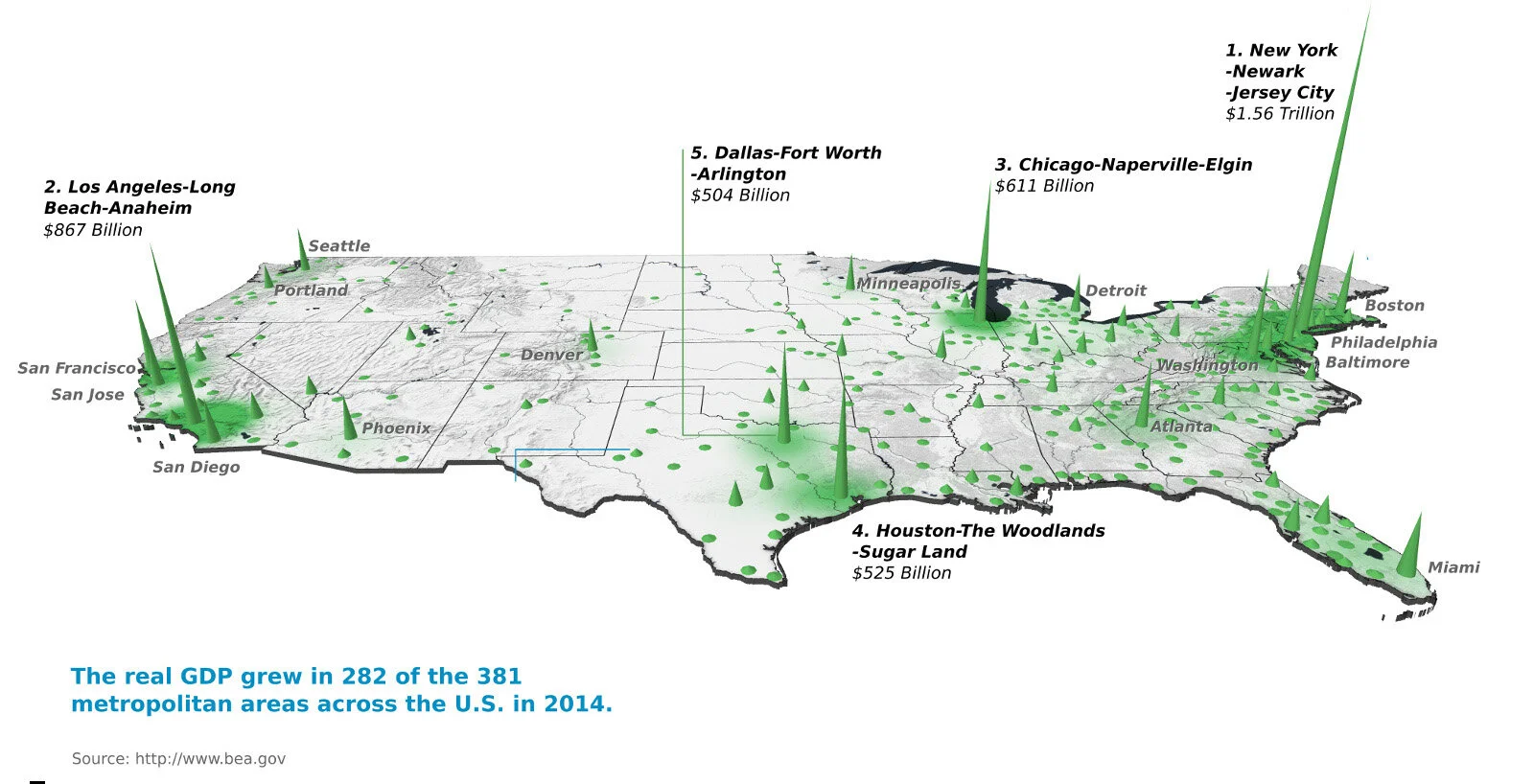Community managed U.S. City gTLD Applications
for the 2022/23 ICANN new gTLD application round
Prepared by Alexander Schubert, Co-Founder of ".berlin"
Why cities as gTLDs? The graphic explains it: metropolitan areas are the GDP growth drivers of the nation.
City gTLDs such as .denver, .chicago or .dallas have the potential to help their citizens to better navigate the Internet as the majority of searches are local these days. In the U.S. only 4 city gTLDs are existing so far: .nyc, .miami, .vegas and .boston. For the leading Internet nation with 325 Million citizens this is a much smaller coverage as for example for the four times smaller Germany.
Here a blueprint as to how to create a successful city gTLD applicant:
Applicant entity:
A gTLD has to be applied for by a legal entity: the "applicant". It has also to be "managed": The business plan has to be established, funds have to be collected, the application has to be created, registrars have to be on-boarded, the citizenry has to be made aware of new gTLD brand.
Traditionally this has been accomplished by companies specialized in creating new gTLDs. Problem: These are usually not situated in the target city and their "goals" are usually orientated in generating profits and revenues fast; and not in creating a vibrant tool for the city.
Solution; splitting the applicant entity into two:
The legal entity which applies at ICANN would be a consortium of representatives of the city constituents. Business associations, chambers of commerce, trade associations. These know the city and its needs the best. These have a trust base with the targeted registrants: the businesses of the city. The business and trade associations are best equipped to distribute the "premium domains" in a way that both benefits the Internet user AND the businesses in the city: The medical profession based business organizations are for example best equipped to identify and distribute amongst their members the medical premium domains - and can in return raise funds for the project. Example: The real estate association of Denver could auction off between their members the rights to future domains such as "apartment.denver" already 2017; thus creating awareness for the project very early on and helping to raise the necessary funds for the application (albeit with the risk that the applicant entity might not be awarded the gTLD). It is a truth that once a multitude of constituents are financially and organizatory involved in a project they will be much more engaged. These entities have usually also very good ties into the city council; hence they are best equipped to make sure that they receive the requisite letter of non-objection required by ICANN.
However: These entities have no knowledge about ICANN, gTLDs and domain operations. A separate "management entity" would be required to lead the project and manage the application process. That management entity could aid 5 to 10 cities - and the resources could be pooled: for example only one application blueprint has to be designed. Common best practices could be established over all applications. The support of the first city councils for their initiative could aid other applicant entities in gaining such support as well. All applicant entities gain from having a gTLD with the same "look and feel". They would all share one Registry Service Provider - and registrar onboarding would be much easier as conducted for all of them at once per registrar. There is even the chance to have tens of thousands of "expressions of interest" from the members of the organizations in each city - hence ICANN might be pursued to allow the entire batch to "fast track"!
The applicant entity would be a non-profit public benefit company; all revenue excess would remain in the city! The revenue excess would be distributed between the business and trade organizations as an incentive to convince their members to pick up the concept and register domains. To create a "trend" and "jump start" the gTLD the registry could initially provide to companies free registrations for 2 to 3 years IF these match their company name (as registered with the organizations) and if they are of non-generic nature (the generic names-space should be preserved). Free registrationsusually create chaos and result in domain-grabbers taking tens of thousands of important generic keyword based domains - diminishing the potential for "real registrants" to build "real websites". Free domains also usually lead to cybersquatting etc. By allocating "free domains" only to known members of the organizations and only if these domains match the company name none of these problems will occur - but the gTLD brand will have a jump-start!
Another major incentive by managing the premium domain name-space of a city gTLD by the relevant local organizations: Online revenue will remain in the city! Example: tires.denver - if that domain would be operated by a "domain investor" who runs a tires.com affiliate program: The revenue of resulting tire sales would go to California or from wherever tires.com is shipping their tires! If however the domain would be allocated by the relevant trade association in Denver they can make sure that the LOCAL (Denver based) retail industry would be supported! Like the nation in general cities are under enormous pressure of "losing" local business via the Internet! A city gTLD which is well managed by the representatives of the local business communities could substantially aid in keeping business in the city!
alexander@schubert.berlin
Phone: +1 (202) 684 6806 & +49 (30) 864 37 863
